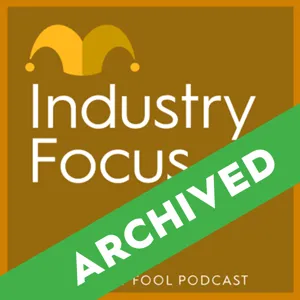Podcast Summary
Waiting for a colleague to start a weekly podcast episode: Rules and traditions provide structure and order, experimentation can lead to unexpected enjoyment, and finding joy in simple pleasures is essential.
Rules and traditions, even if seemingly arbitrary, provide structure and ensure a sense of order in our lives. Kai Risdahl and Kimberly Adams, the hosts of the Make Me Smart podcast, follow this rule by waiting for their colleague Charlton to start their weekly Economics on Tap episode. Kai also shared a personal experience of trying to moonlight as a bartender but ultimately quitting due to late hours. During the podcast, they engage in a casual conversation while enjoying their unique drinks. Kai introduced a new cocktail made with a blueberry rosemary shrub, and despite initially struggling with the vinegar taste, he found it enjoyable. Kimberly, on the other hand, was having a cup of tea. The episode also featured a game of Half Full, Half Empty, and a surprise guest host. Overall, the conversation showcased the importance of adhering to rules, experimenting with new things, and finding joy in the simple pleasures of life.
Silicon Valley Bank: The Second Largest Bank Failure in US History: Silicon Valley Bank, an important financial institution for Silicon Valley businesses, has failed under state receivership due to the impact of rising interest rates on venture debt. This failure, the second largest in US history, will significantly affect startups and their executives, causing disruption to payroll, company deposits, and personal accounts.
Silicon Valley Bank, the first FDIC-backed bank to go under since 2020, has ceased to exist and is now under state receivership. This is a significant event due to the large number of Silicon Valley businesses that did or still do business with the bank, affecting payroll, company deposits, and personal accounts of executives. The bank's downfall can be partially attributed to venture debt, a type of loan given to startups after they've received venture capital investments, which has been impacted by rising interest rates. This development is a fascinating look into the world of finance, specifically venture finance and Silicon Valley startup financing. With over $1 trillion in assets, this is the second largest bank failure in US history. The consequences of this failure are still unfolding and will likely be a major topic of discussion in the coming days and weeks.
DC Health Link Data Breach Exposes Sensitive Information of 100,000: A major data breach at DC Health Link exposed sensitive info of 100,000, including gov employees and relatives, leading to potential misuse and political weaponization. It underscores the need for stronger data protection laws in US.
A major data breach at DC Health Link, an exchange with approximately 100,000 participants, including 11,000 employees and relatives of federal government workers, has resulted in the leak of sensitive information such as Social Security numbers, health information, and addresses. This breach is particularly concerning due to the potential misuse of health information for nefarious purposes, and the possibility of political weaponization. The leak has caused widespread panic among those affected, and members of Congress and their staffs are especially vulnerable due to the sensitive nature of their information. While the leak is a significant issue in its own right, it also highlights the need for stronger data protection laws, particularly in the context of the US not having a federal privacy law. The Biden administration has recently acknowledged this issue, but it remains to be seen if it will lead to meaningful legislation.
Cybersecurity strategy: Companies take on more responsibility: Effectiveness of companies protecting people's info depends on substantial penalties for non-compliance. Team discussed 'Half Full, Half Empty' game and surprise guest host Francesca Levy. Topics included pension plans as a labor market attraction.
The cybersecurity strategy discussed recently places more responsibility on companies to protect people's information instead of relying on users. However, the effectiveness of this approach depends on substantial penalties for non-compliance. In other news, the team discussed trying new things, including a game called "Half Full, Half Empty," where they share their positive or negative views on current news topics. A surprise guest host, Francesca Levy, joined the conversation. One of the topics they discussed was the possibility of companies bringing back pension plans as a way to attract workers in a tight labor market. Francesca expressed a half-full perspective, believing that this could be a positive development for workers who have been struggling with job instability.
Employers and employees responsibilities towards each other in pension plans: Employers have a role in ensuring workers' retirement security, but pension plans face financial challenges. Business schools offer opportunities for career pivots, but an MBA may not be necessary for job security.
Both employers and employees have responsibilities towards each other, and pension plans can serve as a meaningful incentive for employees to stay committed to their jobs for longer periods. However, it's important to acknowledge the financial challenges some pension plans face and the role corporations play in ensuring their workers' retirement security. Additionally, business schools are relaxing their admissions requirements for laid-off tech workers, and while it may offer opportunities for career pivots, it's essential to consider if an MBA is necessary for securing a job in today's economy. Ultimately, it's a complex issue with no clear-cut answers, but recognizing the interconnectedness of various factors can lead to a more informed perspective.
The Job Market and Online Reviews: Balancing Constructive Criticism and Public Expression: While some argue that public revenge reviews can hold businesses accountable, others believe it may not be productive and could harm businesses. A majority of poll respondents believe constructive criticism can lead to improvements.
The job market is shifting, with many companies offering high salaries for positions that don't require a college degree. At the same time, there has been a significant increase in "revenge reviews" on social media and review sites during the pandemic, as people express their frustration with subpar experiences. While some argue that these reviews serve as a necessary outlet for consumers, others believe that publicly airing grievances may not be productive and can be detrimental to businesses. Ultimately, the consensus among the speakers was to offer praise in public and criticism in private. The poll results reflected a slight majority (68%) holding a "half full" view, believing that constructive criticism can lead to improvements, while 31% (half empty) felt that publicly sharing negative experiences may not be helpful.
Leaving negative reviews can protect consumers: Negative reviews can warn others and hold businesses accountable, protecting potential customers from similar experiences.
Leaving a negative review, especially for small businesses, can serve as a warning to other consumers and hold the business accountable for their actions. While some may view it as revenge or punishment, it can also be a way to protect other potential customers from similar experiences. Additionally, the podcast "Make Me Smart" has been providing daily content since the COVID-19 pandemic began, and they are currently fundraising to raise $150,000. They encourage listeners to contribute if they are able, but they are still here every day regardless. Furthermore, there is a new podcast called "Million Brazilian" from Marketplace that aims to help kids understand complex money concepts through exciting adventures.
Unions and Gold Reserves: Part of the Financial System: Unions protect workers' rights and ensure fair treatment while gold reserves maintain economic stability and confidence in currency value
Unions are organizations that represent workers to negotiate better wages, benefits, and working conditions. They exist to ensure fair treatment for employees in various industries. Regarding Fort Knox and the US gold, it's a large military installation in Kentucky where a significant portion of the country's gold reserves is stored for safekeeping. The gold serves as a backup to the country's paper currency and is used to maintain confidence in the US dollar as a stable and valuable currency. When explaining money to kids, it's essential to help them understand that money is a tool used to buy goods and services, and it has value because people agree to exchange it for things they need or want. Unions and gold reserves are part of the larger financial system that helps ensure economic stability and fairness.






